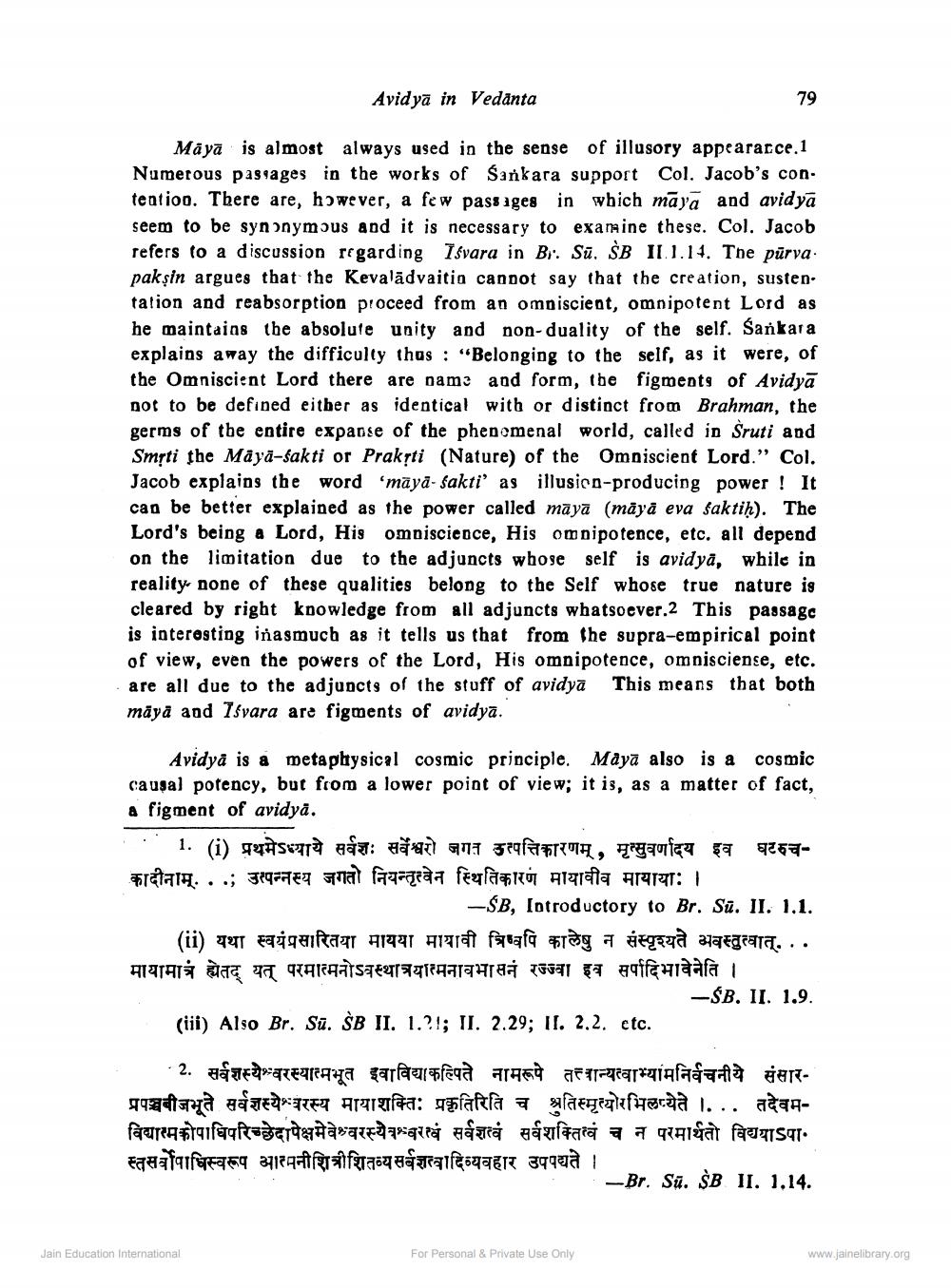________________
Avidyā in Vedanta
Māyā is almost always used in the sense of illusory appearacce.1 Numerous passages in the works of Sankara support Col. Jacob's con. tention. There are, however, a few passages in which māya and avidya seem to be synonymous and it is necessary to examine these. Col. Jacob refers to a discussion regarding Tfvara in Bi. Sū. SB I1.14. The pūrva. pakşin argues that the Kevaladvaitio cannot say that the creation, susten. tation and reabsorption proceed from an omniscient, omnipotent Lord as he maintains the absolute unity and non-duality of the self. Sankara explains away the difficulty thus : "Belonging to the self, as it were, of the Omniscient Lord there are name and form, the figments of Avidyā not to be defined either as identical with or distinct from Brahman, the germs of the entire expanse of the phenomenal world, called in Sruti and Smrti the Mayā-sakti or Prakti (Nature) of the Omniscient Lord.” Col. Jacob explains the word 'māyā- fakti' as illusion-producing power ! It can be better explained as the power called māyā (māyā eva faktiḥ). The Lord's being a Lord, His omniscience, His omnipotence, etc. all depend on the limitation due to the adjuncts whose self is avidyā, while in reality none of these qualities belong to the Self whose true nature is cleared by right knowledge from all adjuncts whatsoever.2 This passage is interesting inasmuch as it tells us that from the supra-empirical point of view, even the powers of the Lord, His omnipotence, omnisciense, etc. are all due to the adjuncts of the stuff of avidya This means that both māya and Isvara are figments of avidya.
Avidya is a metaphysical cosmic principle. Maya also is a cosmic causal potency, but from a lower point of view; it is, as a matter of fact, a figment of avidya.
1. (i) प्रथमेऽध्याये सर्वशः सर्वेश्वरो जगत उत्पत्तिकारणम् , मृत्सुवर्णादय इव घटरुचकादीनाम्...; उत्पन्नस्य जगतो नियन्तृत्वेन स्थितिकारण मायावीव मायायाः ।
-SB, Introductory to Br. Sü. II. 1.1. (ii) यथा स्वयंप्रसारितया मायया मायावी त्रिष्वपि कालेषु न संस्पृश्यते अवस्तुत्वात्. . . मायामात्रं ह्येतद् यत् परमात्मनोऽवस्थात्रयात्मनावभासनं रज्ज्वा इव सर्पादिभावेनेति ।
-SB. II. 1.9. (iii) Also Br. Sū. ŠB II. 1.2.1; II. 2.29; II. 2.2. etc.
- 2. सर्वशस्येश्वरस्यात्मभूत इवाविद्याकल्पिते नामरूपे तत्त्वान्यत्वाभ्यामनिर्वचनीये संसारप्रपञ्चबीजभूते सर्वज्ञस्येश्वरस्य मायाशक्ति: प्रकृतिरिति च श्रुतिस्मृत्योरभिलप्येते ।... तदेवमविद्यारमकोपाधिपरिच्छेदापेक्षमेवेश्वरस्येवश्वरत्वं सर्वज्ञत्वं सर्वशक्तित्वं च न परमार्थतो विद्ययाऽपा. स्तसर्वोपाधिस्वरूप आरमनीशित्रीशितव्य सर्वज्ञत्वादिव्यवहार उपपद्यते ।
-Br. Sū. SB II. 1.14.
Jain Education International
For Personal & Private Use Only
www.jainelibrary.org




